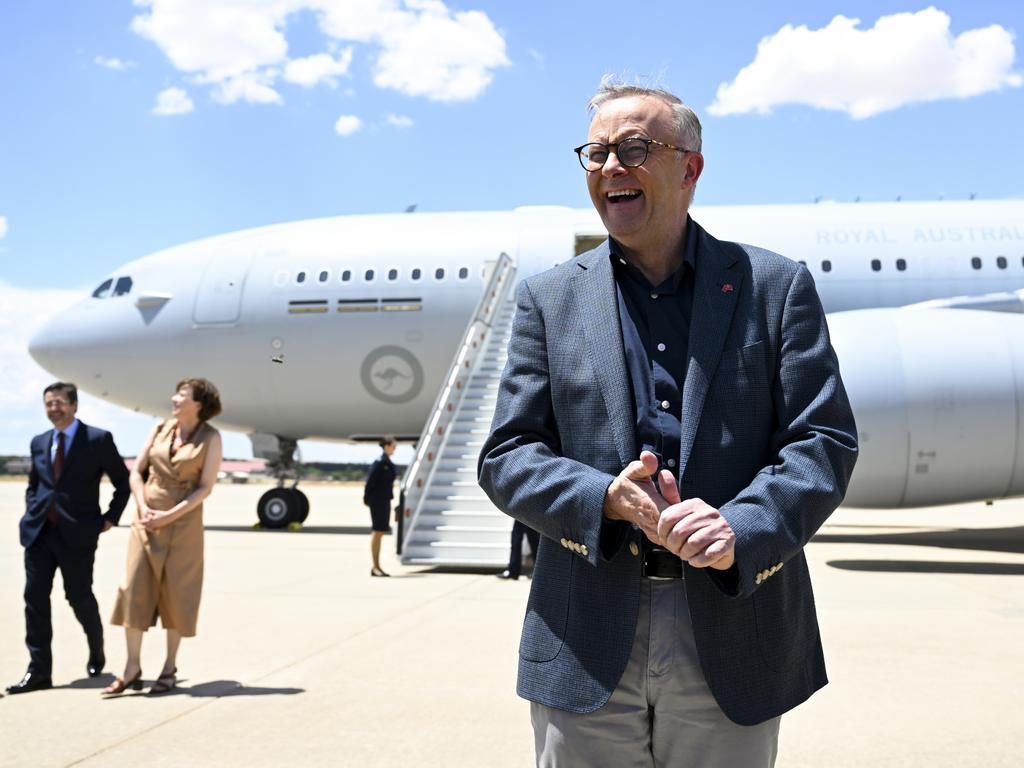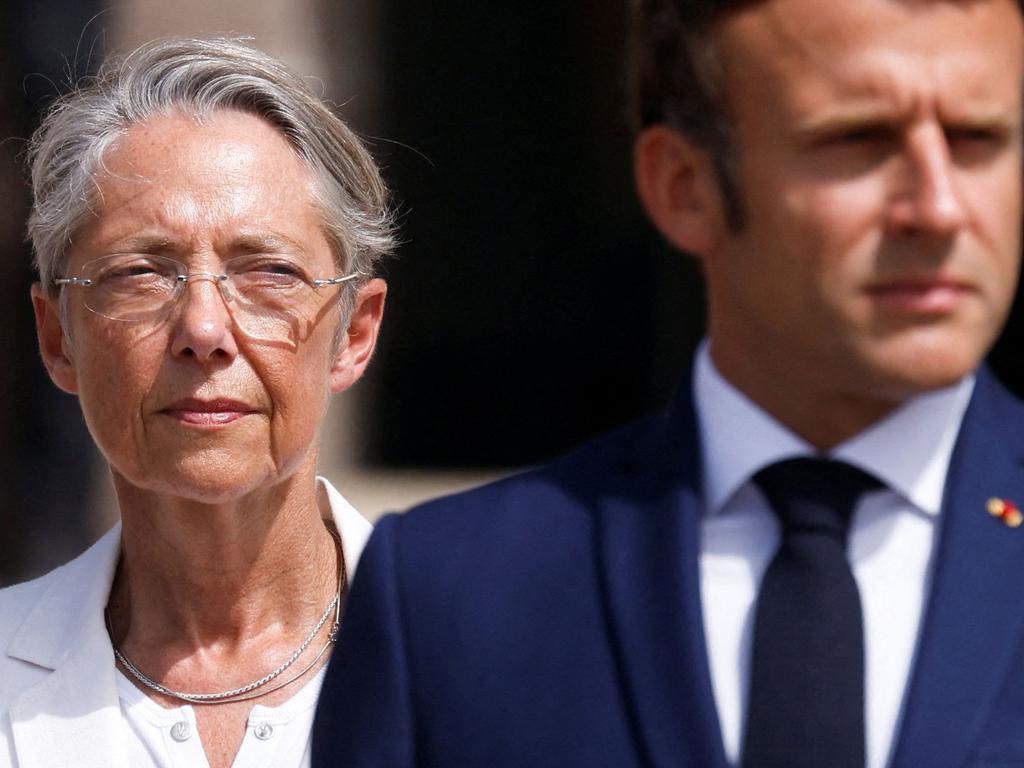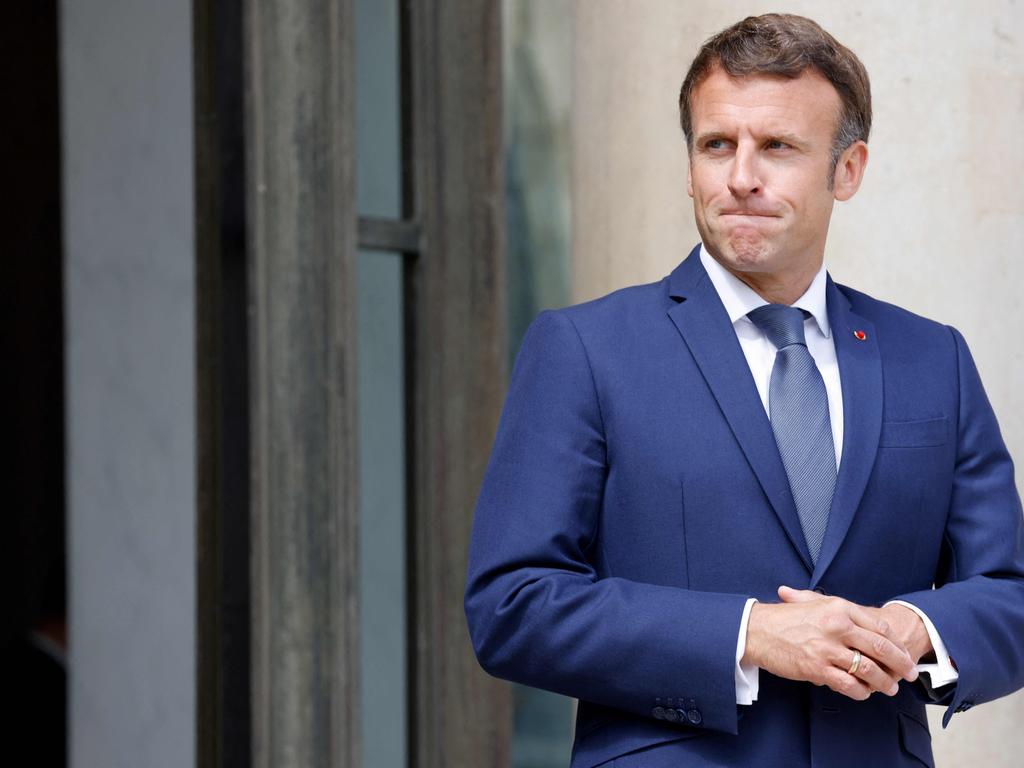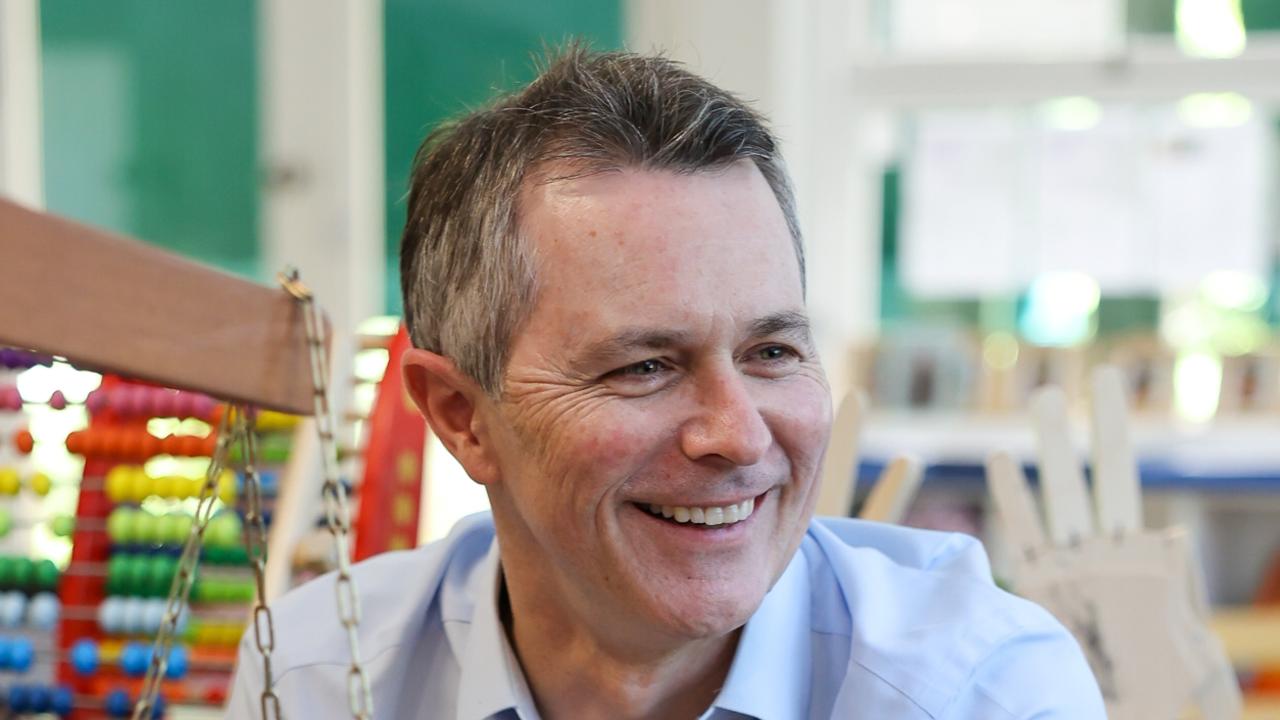Anthony Albanese not to blame for subs rift, Emmanuel Macron says, as leaders reset ties
Anthony Albanese and Emmanuel Macron have formally reset relations, with the French President declaring the PM was not responsible for the subs rift.
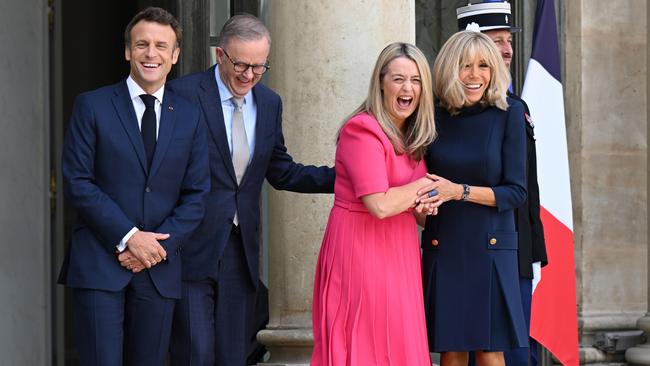
Anthony Albanese and Emmanuel Macron have formally reset relations between Australia and France, with the French President declaring the Prime Minister was not responsible for the rift caused by the cancellation of the Attack-class submarines.
Mr Albanese declared “a new start for our countries’ relationship”, at the Elysee Palace in Paris on Friday. “Australia’s relationship with France matters. Trust, respect and honesty matters. That is how I will approach our relations,” he said.
Asked whether Mr Albanese had apologised for the submarine decision, Mr Macron said he did not blame his Australian counterpart for the decision that sparked a diplomatic row between the countries.
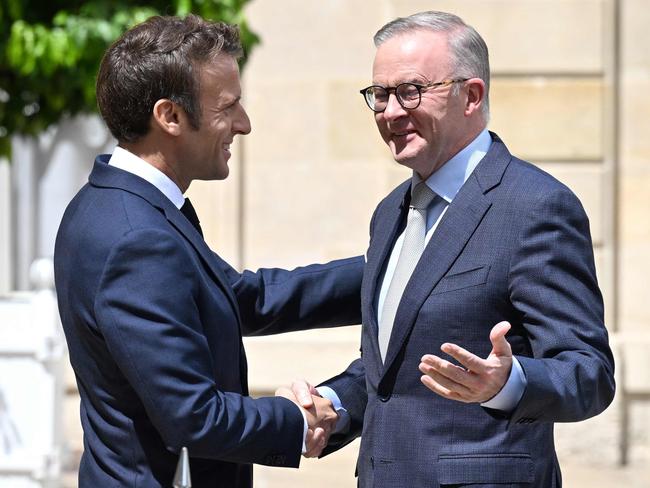
“We will speak about the future, not the past. He is not responsible for what happened.”
Mr Macron and his wife Brigitte welcomed Mr Albanese and partner Jodie Haydon to his official residence, nine months after Scott Morrison’s surprise announcement that Australia would cancel its $90bn contract to buy 12 French-built submarines, and instead acquire nuclear boats in partnership with the US and Britain.
Mr Macron and Mr Albanese shook hands warmly, while the French President kissed Ms Haydon on the hand.
Mr Albanese said he was proud to stand alongside Mr Macron “to commit to deepening our collaboration in defence and security, resilience and climate, and education and culture”.
Mr Albanese earlier told The Weekend Australian that the restoration of the relationship would kickstart economic and security co-operation with the major European and Pacific power, and open doors for Australia across the EU.
He said the renewal of the bilateral partnership would accelerate two-way investment between the countries, and enable the nations to undertake joint maritime exercises in the Pacific.
Friday’s meeting was “an appropriate time, with the new year [July 1], to enter a new dawn and a new arrangement between Australia and France”, he said.
Mr Albanese said the details of his conversation with Mr Macron would remain private, but declared they had “moved beyond” the point where an apology was needed for his predecessor’s handling of the matter.
He said the diplomatic reset, after his government paid $835m in compensation to French submarine Naval Group, had set the relationship between the countries on an upward trajectory, offering “real opportunities” for Australia.
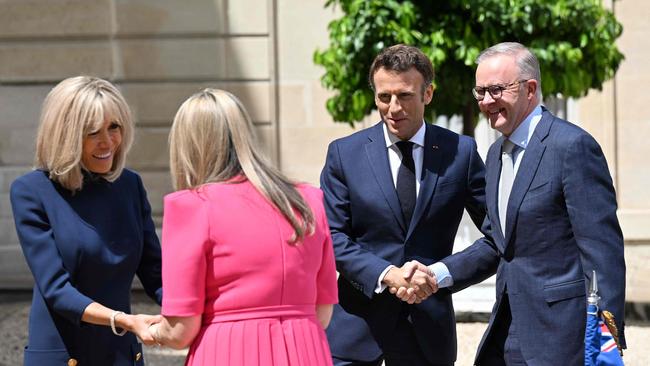
“My objective isn’t to get the relationship back to where it was, my objective is to strengthen the relationship going forward,” Mr Albanese said. “France is a critical power in Europe, but also in the Pacific. And so this relationship is so important.”
The meeting followed Mr Macron’s accusation last year that Mr Morrison lied to him, allowing him to believe the submarine contract was going ahead, before cancelling it to pursue nuclear boats under the AUKUS partnership with the US and UK.
He said the falling out had been “a tragedy”, undermining Australia’s interests across the continent, and with the Biden administration, which also suffered a French backlash.
Mr Albanese, who met a string of European leaders at the NATO summit in Madrid this week, said the reset with France, and his government’s climate change policies, had restored the nation’s “good standing and credibility”.
“It was very clear to me, reinforced by the bilaterals that I had at the NATO summit, that the relationship breakdown with France also damaged our relations with Europe, and indeed with North America as well,” he said.
“Our changed position on climate change, and resolving the issue with France, will have a direct positive impact on the Australian economy and Australian jobs.”
In Mr Macron’s first conversation with Mr Albanese, soon after he was elected, the French President said there had been a “profound breach of trust” between the countries over the submarine issue.
The falling out derailed Australian co-operation with France in the South Pacific, where it has a vast exclusive maritime zone thanks to its sovereignty over French Polynesian and New Caledonia.
Defence’s contract with Naval Group did not entitle the company to compensation beyond a contractual-break fee of €90m ($136m).
But Mr Albanese said it was “very clear that there were obligations that needed to be dealt (with)”, noting the Morrison government put the total cost of the cancelled submarine contract at $5.5 bn. He said his government saved taxpayers $2.1bn, winding up the contract for a fee of $3.4bn.
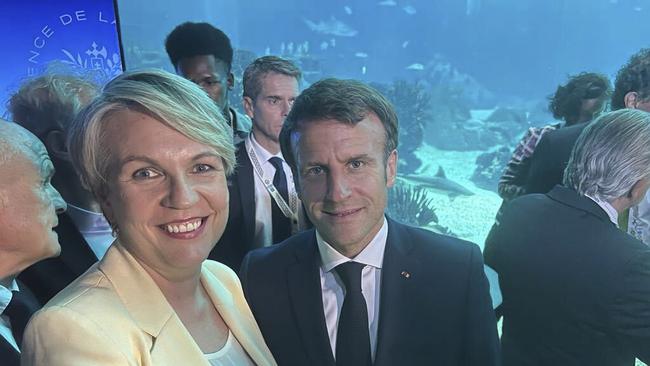
“It’s very clear that there were issues created. I’m about fixing those issues and making sure we can emerge stronger,” Mr Albanese said.
“It is the right decision to have AUKUS. It’s the wrong decision to leak text messages and to not have straight relations with people.”
They signed a communique pledging to “shape a new defence relationship”, including undertaking more joint exercises, sharing intelligence, and delivering coordinated humanitarian support in the event of Pacific disasters.
The nations would “explore initiatives” to increase defence industry cooperation - despite the failure of the Attack-class submarine program - and strengthen cooperation in space and counter-terrorism activities.
They agreed to have further discussions on critical minerals and hydrogen technology, and expressed support for the ongoing free trade negotiations between Australia and the EU.
The leaders committed to working on “low emissions technology”, clean infrastructure and “nature-based solutions”.
They also pledged to strengthen cultural bonds, and work together to bring home Aboriginal and Torres Strait Islander remains held in French institutions.
France’s anger with the Morrison government stalled Australia’s trade negotiations with the EU, with scheduled talks between the parties delayed several times.
But Mr Albanese said the Paris meeting, and earlier talks with EU commissioner Ursula von der Leyen and Spanish Prime Minister Pedro Sanchez in Madrid, led him to believe the free-trade deal could be finalised by the first quarter of 2023.
His meeting with Mr Macron in Paris followed a lifelong affection for the city that began 34 years ago. “I love Paris. The first time I came here was in ’88, you know with a backpack,” he said. “I did six months in Europe, always staying in places that were sort of smaller than the bathroom I have now.”
In just six weeks as Prime Minister, Mr Albanese has already travelled to four countries: France, Spain, Indonesia and Japan. He met fellow Quad leaders in Tokyo, visited President Joko Widodo in Jakarta, and met key counterparts at the NATO summit including Mr Sanchez, German Chancellor Olaf Scholz, Italian Prime Minister Mario Draghi, and South Korean President Yoon Seok-youl.
He said the hectic travel schedule, as the nation confronts soaring inflation and an energy supply crisis, was about “repairing relations and acting in Australia’s national interests”.
Mr Albanese said his diplomatic style was consistent with the way he engaged people at home in Australia.
“I’m someone who is straightforward in my dealings, someone who will be honest and look towards achieving practical outcomes, and dealing with people respectfully,” Mr Albanese said.
On Thursday, he addressed the OECD and was hosted by the peak French business group MEDEF, to discuss trade and investment opportunities. He said the renewed relations would help Australian firms wanting to do business in France, and provide a springboard for French companies operating in Australia, such as defence contractor Thales, and infrastructure company Bouygues.


